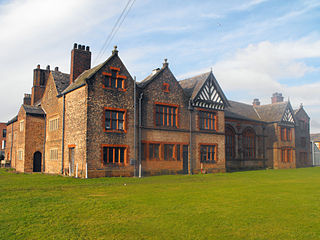Odinism is a term for Heathenry, a modern pagan religion, typically used by those who hold to "folkish" or race-centric ideologies.
Federal or foederal (archaic) may refer to:
State most commonly refers to:
Odin is the chief god of the Norse pantheon.
Various gods and men appear as sons of Odin in Old Norse and Old English texts.
Gaut is an early Germanic name, from a Proto-Germanic gautaz, which represents a mythical ancestor or national god in the origin myth of the Geats.
Waddington is an Olde English surname of Anglo-Saxon English origin. It is thought to derive from the Old English pre 7th Century personal name "Wada", plus "-ing", meaning the tribe or people of", and "tun or ham", a settlement; and hence, "The settlement of the Wada people". It may be connected to be connected with the pre-7th century Old English name "Wade", and the verb "wadan" (wada) meaning "to go", or as a habitational name from the Old English word "(ge)waed" meaning "ford".

Ordsall is an inner city suburb of Salford, Greater Manchester, England. The population at the 2011 census was 14,194. It lies chiefly to the south of the A57 road, close to the River Irwell, the main boundary with the city of Manchester, Salford Quays and Manchester Ship Canal, which divides it from Stretford.

Canberra Hospital is a public hospital located in Garran, Canberra, Australian Capital Territory. It is the largest district general hospital in the region with 672 beds catering to a population of about 550,000. It was formed when the Woden Valley Hospital and the Royal Canberra Hospital were amalgamated in 1991, and was renamed Canberra Hospital in 1996.

In Norse mythology, Vili and Vé are the brothers of the god Odin, sons of Bestla, daughter of Bölþorn; and Borr, son of Búri.

Odin is a widely revered god in Germanic paganism. Norse mythology, the source of most surviving information about him, associates him with wisdom, healing, death, royalty, the gallows, knowledge, war, battle, victory, sorcery, poetry, frenzy, and the runic alphabet, and depicts him as the husband of the goddess Frigg. In wider Germanic mythology and paganism, the god was also known in Old English as Wōden, in Old Saxon as Uuôden, in Old Dutch as Wuodan, in Old Frisian as Wêda, and in Old High German as Wuotan, all ultimately stemming from the Proto-Germanic theonym *Wōðanaz, meaning 'lord of frenzy', or 'leader of the possessed'.
Grimwade is a family name of British origin which includes members of a prominent Australian family; it may refer to:
Wotan is a character in Richard Wagner's opera cycle Der Ring des Nibelungen, inspired by the Germanic god Odin.

Woden is the twenty-eighth solo album by Julian Cope, recorded in 1998-99 and released in 2012 on Head Heritage. It consists of a 72-minute single movement, self described by Cope as "one enormous meteorological cloud of music originally conceived as a vast and atmospheric 72-minute-long follow-up to his Ur-vocal masterpiece ODIN.
This page is based on this
Wikipedia article Text is available under the
CC BY-SA 4.0 license; additional terms may apply.
Images, videos and audio are available under their respective licenses.




